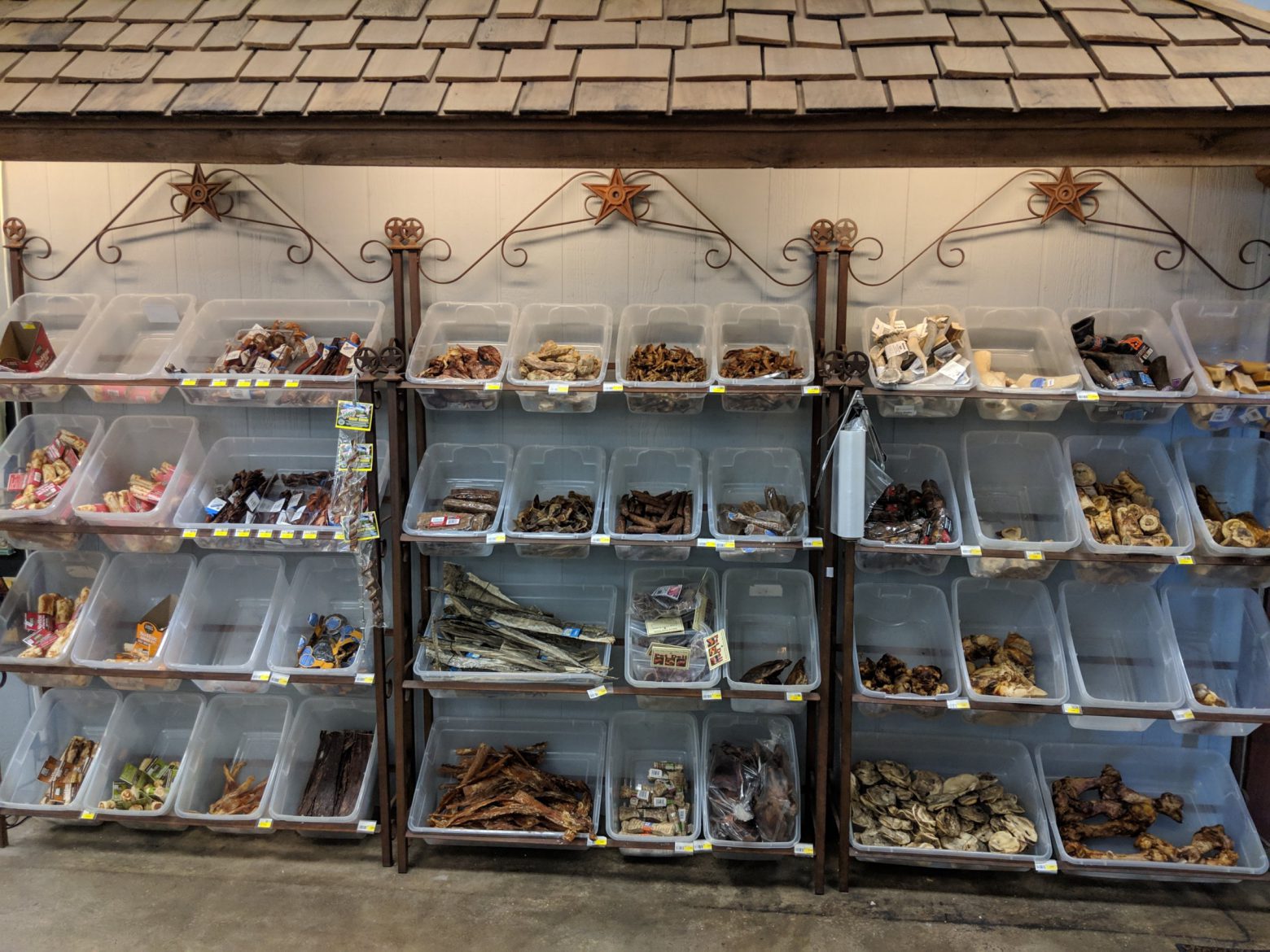Pets have a lot of stuff! It can be hard to be 100% zero waste with an animal. Here are a few ideas that may help lower the environmental impact of your furry friend(s).

Dog treat bag I reused as a trash bag. Pet food and kitty litter bags can be reused as trash bags. If they don’t self-seal you can tape them closed.
Buy in bulk if it’s available. Do ask the store how they fill the bulk bins. The store may be using several small bags or a big bag/box/container to fill the bulk bins. The big bag/box/container may not be as recyclable as lots of small bags so don’t always consider larger to be “greener.” A popular birdseed in my yard comes in a recyclable zippered bag. The enormous bags of birdseed at stores are not recyclable and can best be reused as a trash bag.
If you want to sample something, bulk bins can be helpful regardless of how they’re filled since you only need a little bit. You’ll be zero waste for not wasting have leftovers you don’t use. If you are going to use a lot of something, consider buying the larger container yourself if it’s recyclable/reusable and if you have room to store it.

For an example, Tomlinson’s has bulk birdseed. I asked how they filled the bulk bins and they told me they open a big bag and dump it in. I go through a good amount of birdseed and have room so I may as was well buy my own big bags which I can reuse as trash bags. I did buy several bulk flavors to mix up my own blend in order to see how it went over with my birds vs the pre-made mixes (not good), and so the small samples were good for me to tryout. I bought a 45 pound bag of birdseed at Costco this weekend. It will make a great trash bag and hopefully be a yummy new favorite.

In addition to bulk birdseed, Tomlinson’s also has bulk kitty litter, bulk dog biscuits, and bulk dog treats (pictured at the top of this post). Bark ‘n Purr also has a great selection of bulk treats and natural fiber products.
Some Petco’s have bulk dog biscuits and bulk kitty litter. I haven’t seen a Petsmart that carries anything in bulk. Neither of these chains’ website address in-store bulk options so you’ll need to call of check with your local location.

I put the old set in the City of Austin’s clothing/textile recycling bags.
Most leashes and harnesses are made of nylon (which is a plastic) or leather (usually treated). These materials are not as easily recycled as a natural fiber leash and harness. Check with your clothing/textile recycler to see what fabrics/materials they’ll accept. Nylon and leather may last longer than a natural fiber, so just keep the lifetime and recyclability of items in mind when shopping. I replaced a 13.5 year old nylon leash and harness set (top) with this soy set from Tomlinson’s (bottom). The metal hardwear wore out. Yes, the top was once the same color pink as the bottom!
Buy second hand. Ask family, friends and neighbors if they have anything they’d like to donate or get rid of. Many people have pets items in their garage they’d love to find good homes for! Try free sites like craigslist or Freecycle. I’ve put dog life vests, a dog treadmill, and therapy tub up on craigslist and returned or declined extra surgery cones to my vet. We have a really good cone that we keep and it fits all of our dogs for whatever needs may arise. Don’t forget to take yours with you if you’re getting a procedure that recommends a cone afterwards.

We groom our dogs ourselves which saves money, and it’s easier than driving three dogs around. We bought a human electric razor that my husband uses to cut his hair and we bought a dog fur length blade for the dogs. We clean the razor between uses and species and just switch out the blades. The human electric razor has lasted longer than our two previous pet electric razors. We also clip toenails and express anal glands ourselves. Fur and toenails may be composted in the City of Austin curbside compost cart. See my article Fur and Feet for more information.
I wrote a whole separate article on pet waste, Pet Waste: It’s Waste. A reminder: pet/animal waste cannot be composted in the City of Austin compost carts. It’s also not recommended for backyard composting.
If you have pet shoes, extra clippers, extra toenail/grooming supplies, extra or unused prescriptions, check with your vet to see if they can reuse or re-purpose those items. Unopened pills for example may become a sample/trial option for others, or help low income residents.
Local shelters or low cost veterinary service providers are always in need of donations of old crates, litter boxes, extra food, bowls, bedding, human towels, sheets, pillow cases. Most animal care services have a “wish list” on their website of what they can accept gently used and what they require new.
Don’t forget that old neighborly standby: borrow. If you will need something for a short period of time: someone is visiting, you’re fostering, you rescued a loose pet, you want to try out an item before committing, consider asking if any of your neighbors have items you may borrow. Many are more than happy and eager to assist. They may have great advice as well and you could make a new friend!
